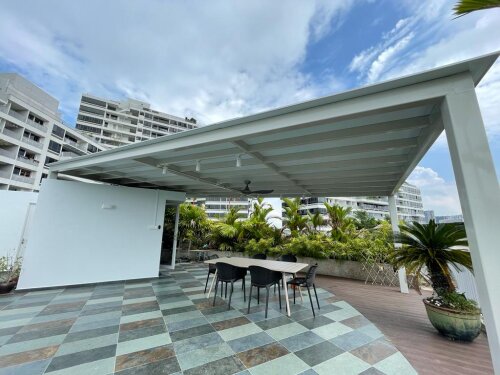Best Climate Change Law Lawyers in Singapore
Share your needs with us, get contacted by law firms.
Free. Takes 2 min.
Or refine your search by selecting a city:
List of the best lawyers in Singapore
About Climate Change Law in Singapore
Climate Change Law in Singapore refers to the legal framework governing issues related to climate change, sustainable development, and environmental protection. As a small island nation vulnerable to rising sea levels and extreme weather, Singapore has made significant efforts to address climate change through legislation, policies, and international cooperation. The city-state's approach involves reducing greenhouse gas emissions, promoting clean energy, enhancing climate resilience, and meeting international obligations under agreements such as the Paris Agreement.
Why You May Need a Lawyer
People and businesses may require legal assistance regarding Climate Change Law in Singapore for several reasons:
- Ensuring compliance with new and existing environmental regulations
- Understanding the legal impact of climate-related policies on commercial activities
- Navigating permitting and licensing for sustainable projects
- Responding to enforcement actions or government investigations
- Drafting agreements that reflect climate-resilient business practices
- Engaging in environmental litigation or dispute resolution
- Participating in public consultations regarding environmental policy changes
- Addressing liability issues related to climate change impacts
- Advising on carbon credits, emissions trading, and green financing
Local Laws Overview
Several local laws and policies form the backbone of Climate Change Law in Singapore:
- Carbon Pricing Act (CPA): Introduced in 2019, the CPA established a carbon tax regime for large emitters of greenhouse gases, creating accountability for emissions and incentivising reduction efforts by major industries.
- Environmental Protection and Management Act (EPMA): This legislation covers pollution control, environmental standards, and blacklists prohibited substances to safeguard natural resources.
- Resource Sustainability Act (RSA): The RSA targets waste reduction, recycling, and the management of electronic, food, and packaging waste in a sustainable manner.
- Building Control (Environmental Sustainability) Regulations: These regulations promote energy efficiency and adopt green building standards under the Building and Construction Authority's Green Mark Scheme.
- Climate Action Plan: The government’s comprehensive strategy to strengthen Singapore's climate resilience and meet its commitments under the Paris Agreement.
Singapore is proactive in updating and enforcing these laws, often introducing new measures in response to scientific and technological developments.
Frequently Asked Questions
What is Singapore's carbon tax, and who does it apply to?
Singapore's carbon tax, under the Carbon Pricing Act, applies to facilities that emit 25,000 tonnes or more of greenhouse gases annually. It is designed to encourage emission reductions in large industrial sectors.
What are the penalties for not complying with climate change regulations?
Penalties may include substantial fines, suspension of business operations, or legal actions. The seriousness of the penalty depends on the nature and impact of the violation.
How does climate law affect companies operating in Singapore?
Companies must review their operations to ensure compliance with emission limits, reporting standards, and sustainable practices. Non-compliance can lead to legal and reputational risks.
Do individuals have obligations under Climate Change Law in Singapore?
While most laws target businesses and industries, individuals may also be subject to regulations, especially regarding waste generation or participation in eco-friendly initiatives.
What is the government’s Climate Action Plan?
The Climate Action Plan outlines Singapore's strategies to mitigate emissions, develop infrastructure resilience, advance research, and support green economic development.
Are there incentives for adopting green technologies or practices?
Yes, the government provides grants, rebates, and recognition schemes to encourage companies and individuals to invest in sustainable solutions and green buildings.
Can businesses trade carbon credits in Singapore?
Singapore supports voluntary carbon markets and is developing frameworks for carbon credit trading, especially for businesses seeking to offset their emissions credibly.
What legal steps are required for a green development project?
Developers must obtain approvals, conduct environmental impact assessments, and comply with building and energy efficiency regulations before commencing green projects.
How does Singapore contribute internationally to climate change efforts?
Singapore actively participates in global climate negotiations, shares expertise in urban solutions, and invests in regional climate resilience collaborations.
Where can I find updates on climate change laws in Singapore?
Updates are published on government agency websites and gazetted by authorities such as the Ministry of Sustainability and the Environment and the National Environment Agency.
Additional Resources
Several resources and organizations provide valuable information and assistance related to Climate Change Law in Singapore:
- Ministry of Sustainability and the Environment (MSE): Publishes policies, updates, and legislation regarding Singapore's climate initiatives.
- National Environment Agency (NEA): Manages environmental protection, provides guidance for industries, and enforces regulations.
- Building and Construction Authority (BCA): Oversees green building standards and sustainable construction practices.
- Singapore Environment Council (SEC): Offers environmental education and promotes sustainable business practices.
- Singapore Green Building Council (SGBC): Provides support for green building technologies and certifications.
- Law Society of Singapore: Maintains directories of qualified legal practitioners, including those with expertise in environmental and climate law.
Next Steps
If you believe you need legal assistance in relation to Climate Change Law in Singapore, consider taking the following steps:
- Identify your specific legal needs or concerns, such as regulatory compliance, project development, or dispute resolution.
- Gather relevant documents, records, and background information to facilitate a productive legal consultation.
- Consult the Law Society of Singapore to locate a lawyer or law firm with relevant experience in environmental or climate change law.
- Contact governmental agencies or industry bodies for guidance on grants, incentives, or compliance requirements.
- Stay informed about policy and regulatory changes by regularly checking updates from official websites and subscribing to relevant newsletters.
Early consultation with a qualified lawyer can help you navigate the evolving legal terrain, minimise risks, and contribute to Singapore’s climate objectives.
Lawzana helps you find the best lawyers and law firms in Singapore through a curated and pre-screened list of qualified legal professionals. Our platform offers rankings and detailed profiles of attorneys and law firms, allowing you to compare based on practice areas, including Climate Change Law, experience, and client feedback.
Each profile includes a description of the firm's areas of practice, client reviews, team members and partners, year of establishment, spoken languages, office locations, contact information, social media presence, and any published articles or resources. Most firms on our platform speak English and are experienced in both local and international legal matters.
Get a quote from top-rated law firms in Singapore — quickly, securely, and without unnecessary hassle.
Disclaimer:
The information provided on this page is for general informational purposes only and does not constitute legal advice. While we strive to ensure the accuracy and relevance of the content, legal information may change over time, and interpretations of the law can vary. You should always consult with a qualified legal professional for advice specific to your situation.
We disclaim all liability for actions taken or not taken based on the content of this page. If you believe any information is incorrect or outdated, please contact us, and we will review and update it where appropriate.
Browse climate change law law firms by city in Singapore
Refine your search by selecting a city.











